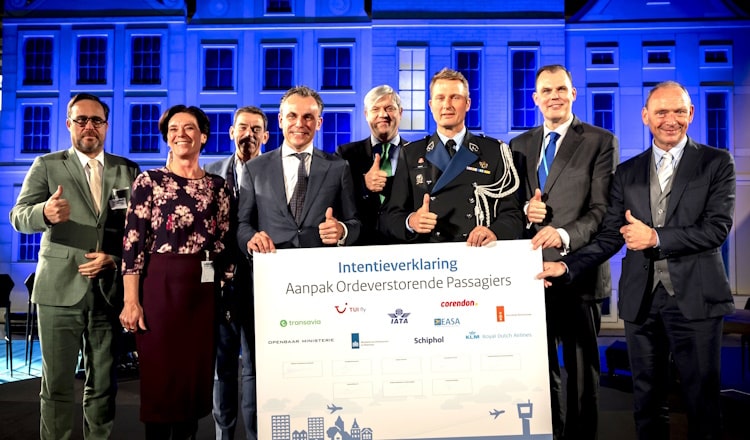
The aviation sector and the government will jointly take measures to reduce the number of ‘airline ASOs’. The reason for this is that disruptive passengers, also known as unruly passengers, are increasingly causing problems in aviation. Last year, for example, KLM saw the number of ‘airline ASOs’ on its flights double compared to 2019. In many cases, booze is involved. Disruptive passengers cause problems in aviation, says KLM. With their verbally aggressive behavior, or sometimes even physical violence, they can cause safety risks, both on board and in the departure hall. This behavior often has a major impact on fellow passengers and the crew. Also, it can lead to diversions and flight delays. The aviation sector and the government are already working together to combat this problem, but they want to do more. To this end, all parties involved signed a letter of intent on 14 December. The parties will investigate how passengers can be made aware of the consequences of their behaviour more effectively. It is also investigating how staff can be better trained to deal with these types of incidents. Since May, a digital declaration form has been in place, with which staff can easily file a report against disruptive passengers. Anyone who misbehaves on an airplane or on the ground must be dealt with. It is important that staff on board and in the departure hall are aware of the possibilities for this. Airlines keep so-called ‘No Fly-lists’ of passengers who have misbehaved on their planes, at Schiphol or at outstations. The signatories will investigate whether this type of information can be shared between all Dutch airlines, taking into account all existing privacy regulations. Since 2022, KLM and its subsidiary Transavia have been sharing data within the KLM group on passengers who have been placed on the No Fly list due to unacceptable behaviour on board or on the ground. Passengers will be banned from flying for at least five years on both airlines if they misbehave on a Transavia or KLM flight. KLM has seen a doubling of the number of unruly passengers on its flights compared to 2019. In 2023, an average of 30 disruptive passengers per month were registered; In 2019, there were an average of 15. Many cases (60 percent) occurred on board; 40 percent in the departure hall. In more than half of the cases, alcohol plays a factor. ‘Flying is one of the safest forms of transport,’ says Mark Harbers, outgoing Minister of Infrastructure and Water Management. “It is unacceptable that there are people who misbehave on an aircraft and thus endanger the safety of passengers and staff. Unfortunately, it is also becoming more and more common. It is important that we work together with all parties involved to further reduce these types of incidents.’ At KLM, safety for passengers and employees is paramount, says Leen van Duijn, VP of KLM Security Services. “We do not tolerate any form of violence on board or on the ground. The consequences of passengers misbehaving are severe; This has a major impact on our passengers and our colleagues. Any form of physical violence towards our crew or fellow passengers is unacceptable. Unfortunately, we have to conclude that the number of ‘unruly passengers’ has increased considerably. What we experience in the sky is a reflection of society. It is therefore good that this problem is being tackled jointly with the aviation sector and the government.’ The letter of intent has been signed by Royal Schiphol Group NV, Transavia, KLM, TUI, Corendon Dutch Airlines, the Public Prosecution Service and the Royal Netherlands Marechaussee. The Netherlands is the third country in Europe to sign such a declaration, after Norway and Ireland. The subject is on the international agenda more widely, including at the European and international aviation organizations EASA and IATA. (Photo KLM).